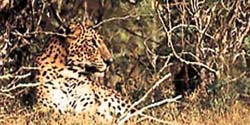






|
Waiting Leopard
Persecuted by humankind, the Leopard has become a shyer
and essentially nocturnal animal
By Charith Pelpola
"Sal blossoms lie soft and moist under my feet like
a fragrant carpet. Mists drift wraith-like through the trees pulled by
unseen hands, and the rain plays a gentle refrain on the leaves. A kind
of sadness fills the air and seeps into my soul. Even the birds and the
crickets are hushed, as if in mourning. The mystique of an awesome, almost
magical presence, never seen but always felt, is no more. The forest will
never be the same again."
- P. K. Ghosh
While many believe the leopard popu- lation is
increasing in India - particularly as a result of its highly adaptable
nature, enabling the animal to survive in secondary and marginal forest,
in close association with humans - the same cannot be said in Sri Lanka.
With restricted lands, and fragmented prey populations, the leopard
is slowly being herded into a few remaining sanctuaries; islands in a vast
sea of disciplined, agricultural land.
In the old days, at Wilpattu, the reputedly elusive leopard, had become
sufficiently bold to walk the jungle paths by day; flaunting its dappled
coat in the shade of rain trees and lianas. But the times have changed
and the leopard has found its shadow unveiled by the persecution of humankind;
becoming much shyer and essentially nocturnal.
They now show themselves rarely. An occasional vaporous sawing call,
a sudden explosive cough, the nervous chatter of monkeys, or the barking
alarms of stags, may shatter the silence of the night, and betray his existence
to the full moon. But the leopard now hunts invisibly; a spectre by day,
a ghost of the night.
 The
leopard's natural history began around three million years ago, its origins
in the primeval savannahs of India. The ancestral cat, with a heavy build
suited to the open plains and sparse, dry forests, spread forever eastwards
and southwards, leaving behind isolated populations as it travelled. These
subsequently evolved on subtly different lines. Amongst them the Javan,
the Amur and Anatolian of Russia and China and the African. Some even believe
that our Sri Lankan race has evolved sufficiently from the mainland Indian
leopard, to be granted its own sub-species, Pantheraparadus kotiya. The
leopard's natural history began around three million years ago, its origins
in the primeval savannahs of India. The ancestral cat, with a heavy build
suited to the open plains and sparse, dry forests, spread forever eastwards
and southwards, leaving behind isolated populations as it travelled. These
subsequently evolved on subtly different lines. Amongst them the Javan,
the Amur and Anatolian of Russia and China and the African. Some even believe
that our Sri Lankan race has evolved sufficiently from the mainland Indian
leopard, to be granted its own sub-species, Pantheraparadus kotiya.
What is often overlooked in the evolutionary tale of the leopard is
the close relationship it shared with a now distant cousin, the jaguar.
Both big cats survived and continued to evolve, side by side, in Eurasia.
From there, the jaguar pushed southwards into Africa, crossing the Bering
Land Bridge into early North America. As the continents drifted, and the
bridge retreated beneath the waves, the cousins became separated forever,
leaving the leopard to roam the vast kingdoms of Eurasia and Africa alone.
Throughout most of its range, the leopard soon retreated to the cover of
the trees, out-manoeuvered on the plains by the lion and the tiger. Taking
on an almost arboreal way of life, it lost its bulk, and became an agile
climber, relying on stealth and cunning to catch its prey.
In Sri Lanka, the leopard's only real adversary is the sloth bear, an
awkward yet deceptively efficient killer. But they share a mutual respect
for each other's capabilities.
Perhaps it is the leopard's adaptability that may be its reckoning.
As the contours of the land are changed over decades, at a rate not experienced
for thousands of years, the cat may retreat to the highlands, or seek isolation
in the remote mountains.
But you may find him still, on Leopard Rock in Yala. A solitary sentinel,
a recumbent shadow, revealed by the setting, auburn sun. He may betray
himself behind the plains grass, or the branch of a palu tree; keeping
his distance, and waiting. Waiting for you, waiting for the scents of this
wild earth to return to him, where he may walk surely, the keeper and his
kingdom.
|





 The
leopard's natural history began around three million years ago, its origins
in the primeval savannahs of India. The ancestral cat, with a heavy build
suited to the open plains and sparse, dry forests, spread forever eastwards
and southwards, leaving behind isolated populations as it travelled. These
subsequently evolved on subtly different lines. Amongst them the Javan,
the Amur and Anatolian of Russia and China and the African. Some even believe
that our Sri Lankan race has evolved sufficiently from the mainland Indian
leopard, to be granted its own sub-species, Pantheraparadus kotiya.
The
leopard's natural history began around three million years ago, its origins
in the primeval savannahs of India. The ancestral cat, with a heavy build
suited to the open plains and sparse, dry forests, spread forever eastwards
and southwards, leaving behind isolated populations as it travelled. These
subsequently evolved on subtly different lines. Amongst them the Javan,
the Amur and Anatolian of Russia and China and the African. Some even believe
that our Sri Lankan race has evolved sufficiently from the mainland Indian
leopard, to be granted its own sub-species, Pantheraparadus kotiya.